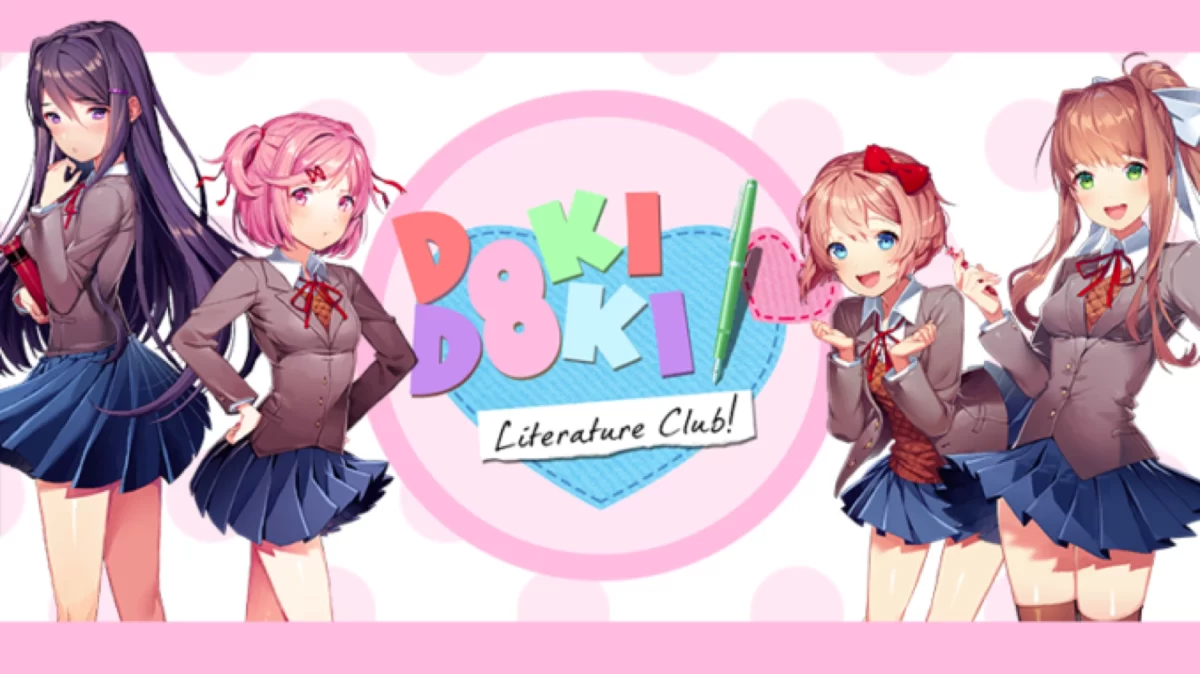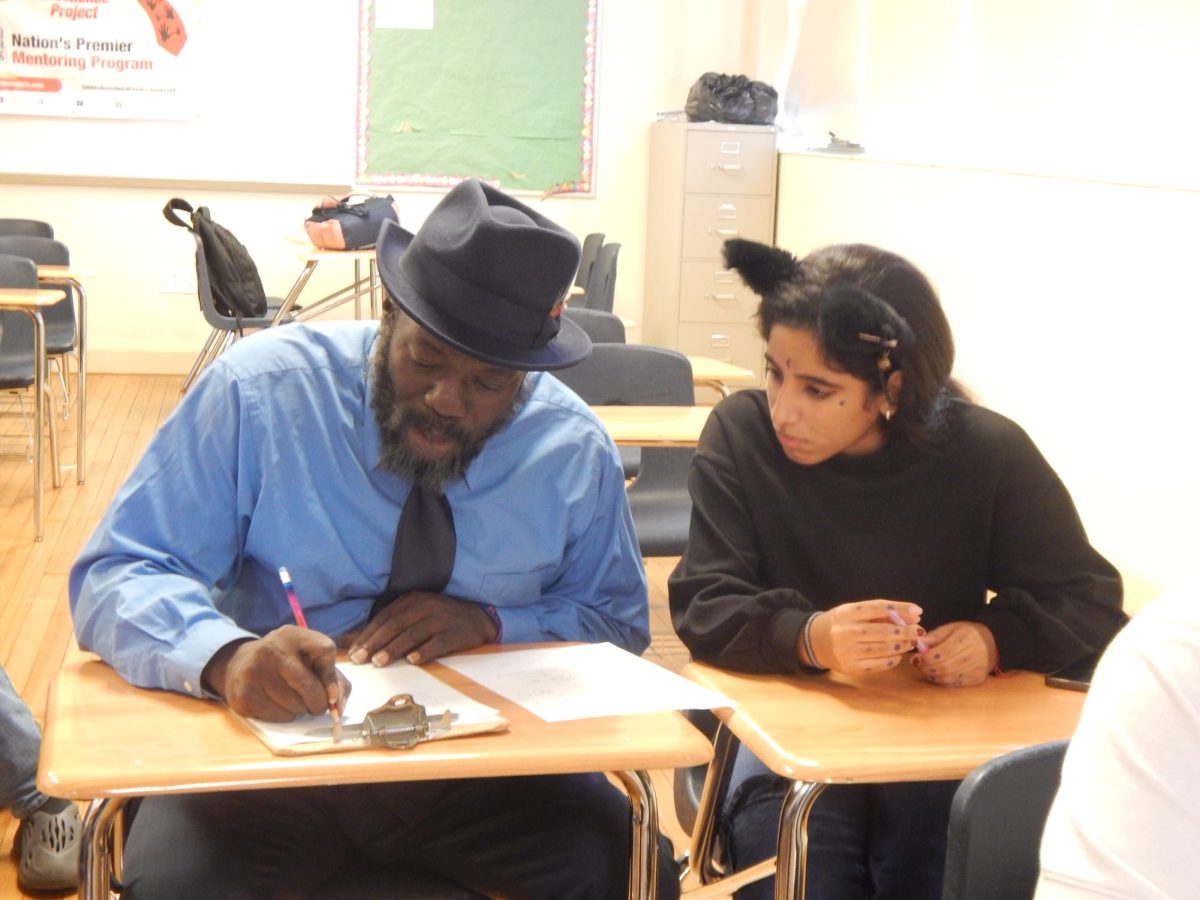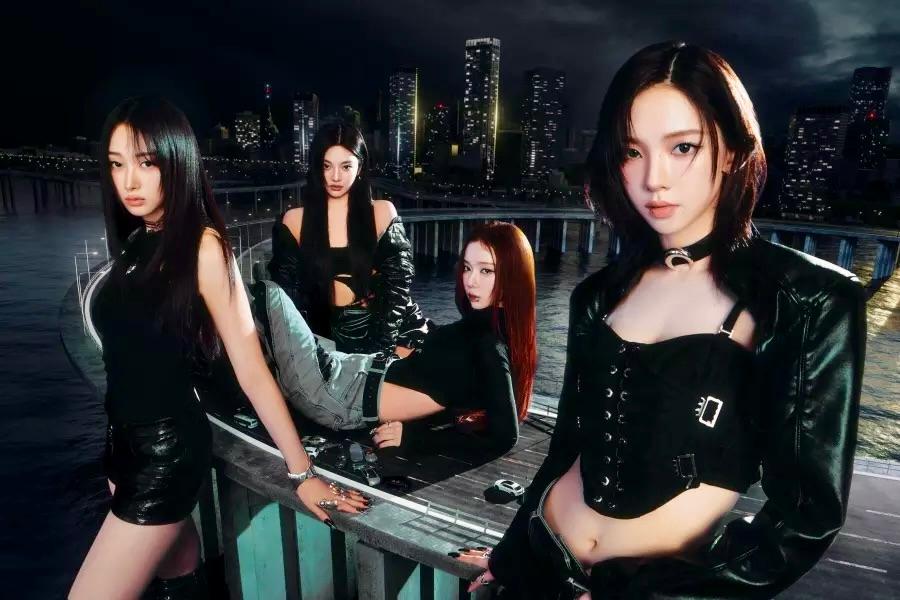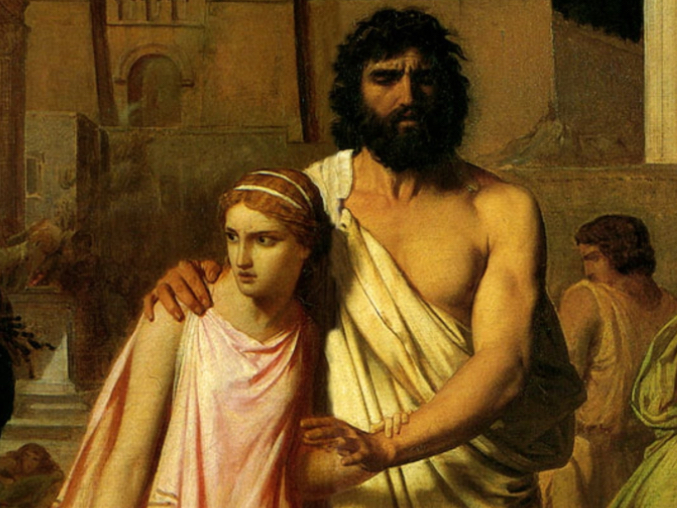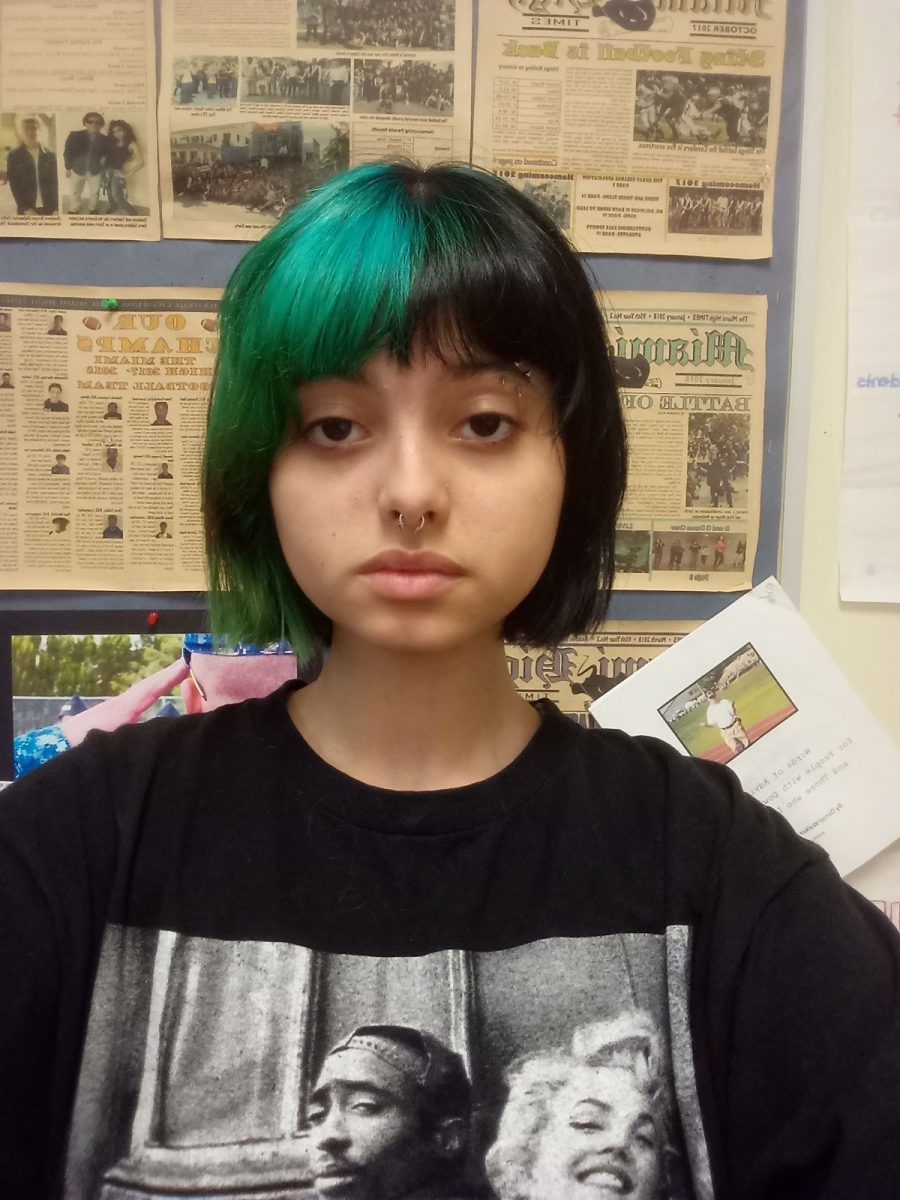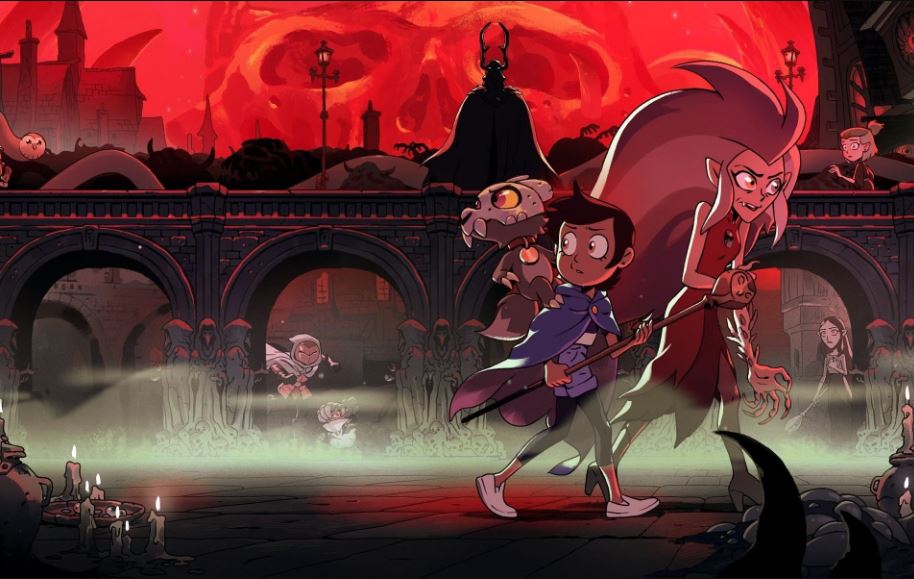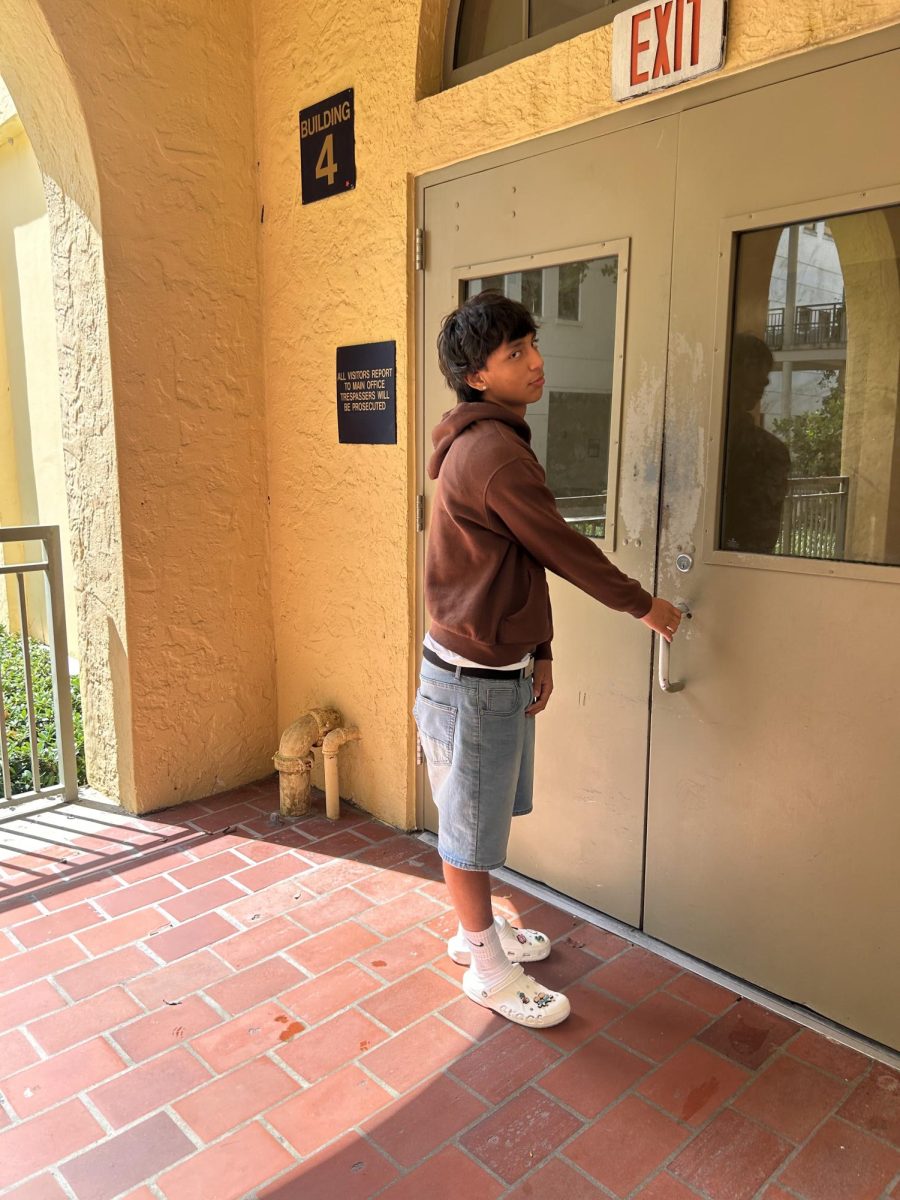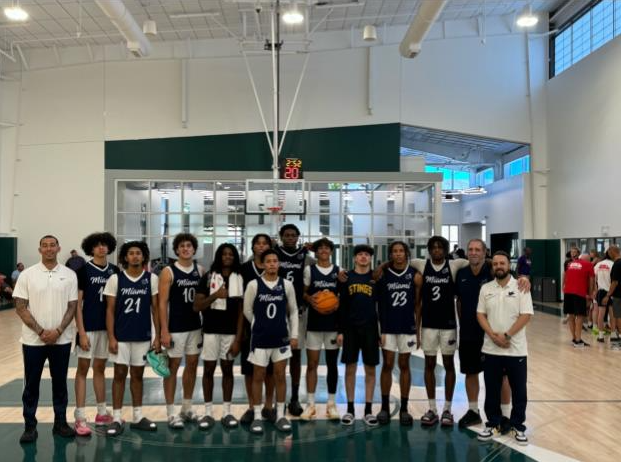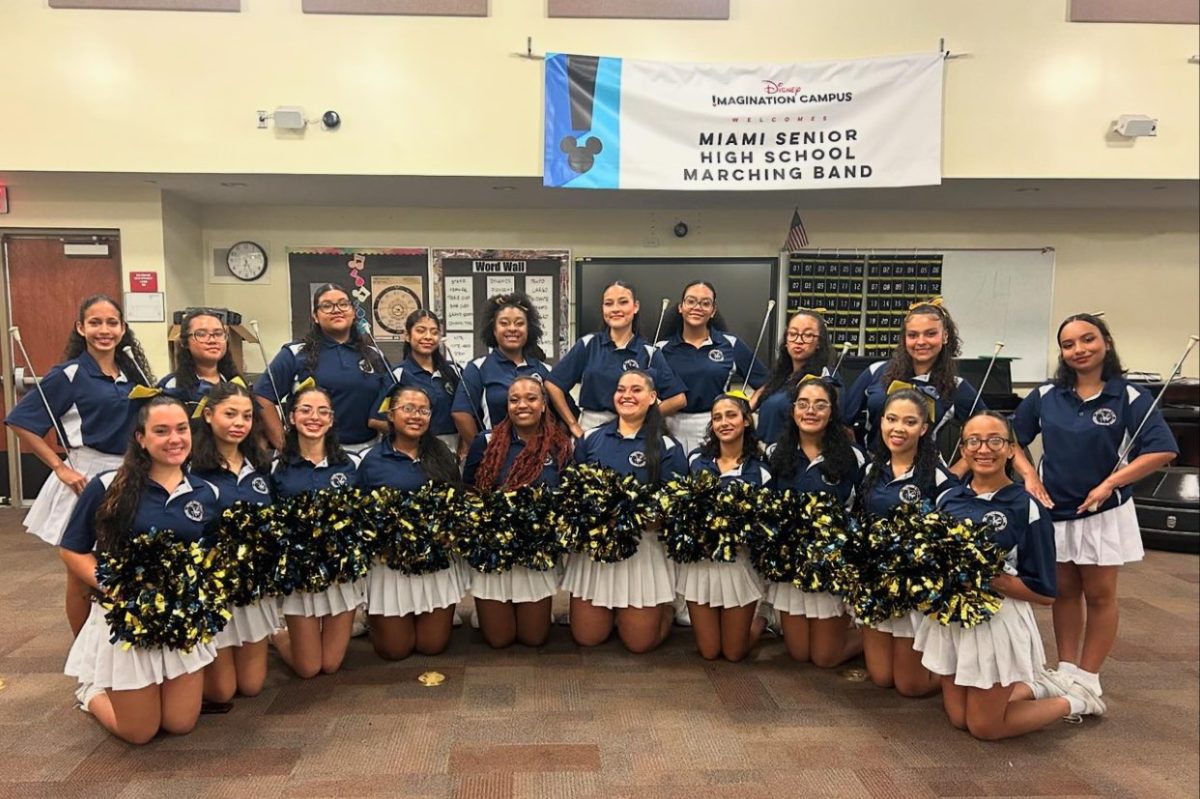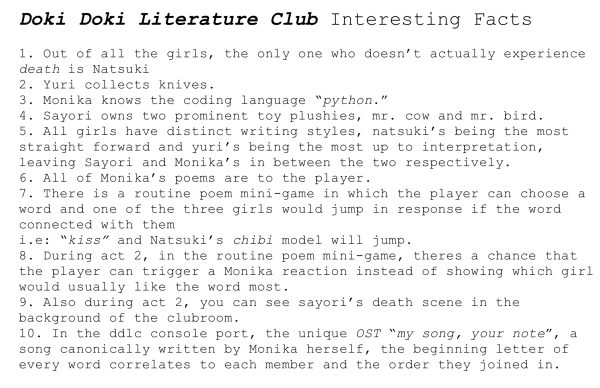
Doki Doki Literature Club is a psychological horror visual novel developed in a two-year period by a team led by Dan Salvato. It was released on September 22, 2017, on the platform itch.io, and then later on it was added to Steam, a popular video game distribution software, as a full game. The game was advertised as a romance visual novel, and many people were lured in by the beautiful art and character design.
According to the Doki Doki Literature Club entries on Wikipedia, Dan Salvato had always had a ‘love-hate relationship with anime’ and made DDLC as a way to fight against the tired-old cliché of “cute girls doing cute things.” He realized that he could twist the genre on its head; the game was also a love letter to the visual novel genre itself.
Character Descriptions
The main characters (and love interests) of the game are four high school girls. Each of the girls follow a cookie-cutter trope that is commonly found in other media, but depending on which route you follow in the game, you’ll find out a bit more about their personality and backstory.
Sayori, the Vice President of the Literature Club, is the childhood best friend trope. Sayori’s appearance is messy, and her personality is lazy and silly. She is later revealed to have depression.
Natsuki is the tsundere (harsh lover) trope. Natsuki’s appearance is frail and cutesy, but her personality is much more aggressive. The reasoning for her harsh personality is later shown to be caused by trust issues and problems at home.
Yuri is the yandere (obsessive lover) trope. Her appearance is mature and elegant; her personality is secluded and quiet, although she can be extremely passionate about things she cares about. Yuri is later found to be addicted to self-injury.
Monika, the Literature Club’s President, is the perfect student trope. Her appearance is well-kept and proper. She is the only girl without a route (story path).
Advertisement
Doki Doki Literature Club was advertised as a romance visual novel, and what made it so believable were the adorable characters, upbeat soundtrack, and its obvious reuse of popular and famously overused character tropes. Since the development team behind DDLC was brand new, nobody knew what to expect, and therefore trusted the advertisement and initial look of the game.
Skepticism
After the initial release of DDLC, it didn’t take long for reviews to start commenting on the game’s actual events. As a result, the user-defined tags under the visual novel properly advertised its content as “psychological horror”. Many people coming across DDLC’s store page on Steam thought it was a joke, as incorrect tagging on games happens from time to time. Some played the game to check it out, and since the horror parts of the game don’t happen until the end of Act 1, many believed it to be false.
Reaction
After a while, big internet personalities such as Markiplier, Jacksepticeye, and PewDiePie, all famous let’s-play YouTubers, significantly aided in promoting the game. Many people would think that this game was out of character for them to play, and not be very interested in the first video. Eventually, after the first half of Act 1–which is the most common place for people to end the first recording–YouTubers started including the horror element of the game into their thumbnails, intriguing viewers to learn more about DDLC.
Monika
Monika is the antagonist of DDLC. She’s used as the tutorial character, giving hints on useful game mechanics. Although that trait of hers is unusual, since she’s also a character in-game that interacts with the others. It later gets revealed during the very end of Act 2 that Monika is self-aware and is able to conceptualize the existence of two realities: her reality (the game itself) and our reality.
During Act 3, where she tells the player that she has “deleted” the other girls’ files, we learn that Monika is able to manipulate the game’s files, going as far as to calmly tell the player how she did it. This becomes crucial information to move on from Act 3. She confesses to the player that she loves them and says that her motive for “killing off” her friends is because they were in the way. They were only in love with the protagonist, an inaccurate representation of the player, and that she’s in love with the person behind the screen.
To move on from Act 3, you must delete Monika. After deleting her, she panics and tells the player that she was foolish for falling in love with them, and that she hates them. Almost immediately after her hateful rant, she tells the player that even after that, she still loves them. She says that she never fully got rid of the files for the others, since she still considered them to be her friends. She then reloads the game and lets the player restart DDLC without her, presumably letting them play through a normal dating simulator.
Because of her absence, Sayori fills the role as President of the Literature Club, and we learn that Monika wasn’t aware of the game because of her nature, but because she was the president. After this is revealed, Monika steps in one last time to delete the entirety of the game. If the player attempts to re-open DDLC, a letter from Monika will appear. Her letter tells the player that she doesn’t want her friends to experience the same world-shattering epiphany that she did, and that the continuation of the Literature Club will just end up with everyone being unhappy. The topic of whether or not Monika is worth sympathizing with is very common within the community.
The Fourth Wall
The fourth wall is a concept that exists in media made for entertainment. The fourth wall is the window we are able to see media through. To “break” the fourth wall is to completely ignore the conceptualized boundary set between the audience and the characters. The earliest recorded instance of a fourth wall “break” was in 1918, from the silent film Men Who Have Made Love To Me, a biographical film made by Mary MacLane. In the film, MacLane, who acts as herself in the film, intervenes with the film’s vignette, and addresses the audience directly.
DDLC perfectly develops the shock factor with the fourth wall break, dropping small hints along the way of playing through the game, which if ever acknowledged, makes the player feel uneasy. Fourth wall-breaking moments in DDLC before the end of Act 2 up till the absolute end of the game are all so slight that it fits in perfectly with the glitching horror of Act 2.
Inspirations
The creator of Doki Doki Literature Club, Dan Salvato, took inspiration for DDLC from three notable games: You, and Me, and Her, Yume Nikki, and Irisu Syndrome. You, and Me, and Her, which is commonly shortened to Totono, is a game released in 2013, very similar to DDLC. It disguises itself as a dating simulator, one that locks a second ending behind the completion of the first route, then shocks the player with sudden, unprompted horror on the second route. It’s evident that Totono was very important for the creation of DDLC.
Yume Nikki is a free roam RPG released in 2004 where strong, surreal, and psychological visuals are the main focus of the game. It’s very easy to assume that its uncanny visuals inspired the glitchy body horror aspect of DDLC.
Finally, Irisu Syndrome is a cute-looking puzzle game released in 2008 that further explains the lore the more puzzles you complete. A vast majority of the story is unlocked in the game’s files, which inspired DDLC’s use of files for its gameplay.

